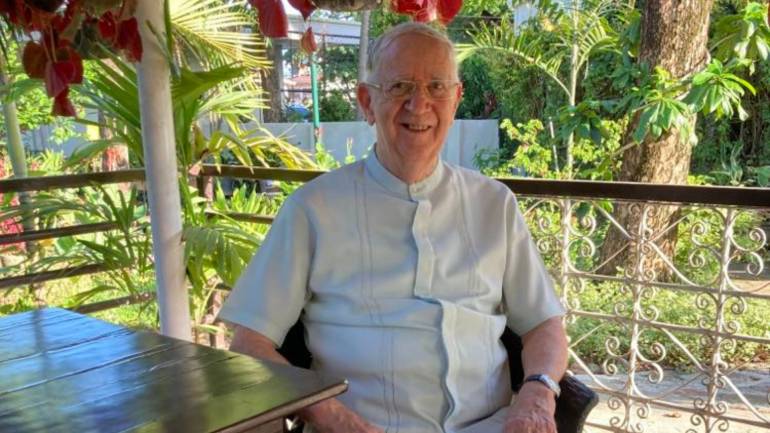'Church is undergoing epoch changes,' says an Octogenarian Redemptorist priest

The Redemptorist priest, who has devoted more than half of a century to missionary endeavors in the Philippines, asserted that technological advancements are causing epochal changes within the church.
“The Church is now undergoing epochal changes, pointing to Pope Francis’ teachings in the context of the 2nd Vatican Council, modernism and rapid technological advances,” said redemptorist priest Fr. Allen O’Brien, CSsR, in an interview with Radio Veritas Asia (RVA).
He said that the confluence of these factors has altered society and the way people live, and it has also impacted the faith of the people and the future of the Church.
The 82-year-old priest said that he no longer keeps a busy schedule related to his duties in the Our Mother of Perpetual Help parish in Cebu City, Philippines, but he remains actively engaged in the mission work of the Congregation of the Most Holy Redeemer, popularly known as Redemptorists.
He arrived in Cebu in 1968, joining many other priests to minister to people living in poverty-stricken urban villages in Cebu, Negros Oriental and Davao. Poor city dwellers welcomed them to live with them and perform sacraments, but the social condition in the Philippines during the early 1970s made their mission complicated, if not fraught with danger.
During the early 1970s, people suspected that the Redemptorists held discussions about social issues that influenced public opinion against military abuses during the first Marcos administration.
The most prominent Redemptorist to speak out against human rights abuses under the military regime was Fr. Rudy Romano. The military allegedly abducted him in Cebu City in July 1985. He remains missing to this day.
In addition to his responsibilities in the OMPH parish, Fr. O'Brien received the assignment to oversee DYRF, the Redemptorists' radio station. The regular programming consisted of news, music, soap operas and programs dedicated to the mission and reflections on the gospel.
Under his management, DYRF shot up in the ratings and became the number-one radio station in Cebu and a favorite among AM radio listeners in parts of the Visayas. The Society of Divine Word (SVD) now manages DYRF after it was turned over to them.
Nowadays, Fr. O'Brien makes himself available when asked by parishioners for spiritual direction and confessions. Sometimes he goes up to the Redemptorist-run Holy Family retreat house, located four kilometers away from the convent.
The assignments are a far cry from his work as a missionary and CEO of a commercial broadcast station of days gone by, but since the tasks are still in line with the Redemptorist mission “to preach the Gospel, especially to those who feel abandoned and live on the edges of church and society,” O’Brien said he remains relevant as a Redemptorist.
The Redemptorists arrived in Opon, the old name of Lapulapu City on Mactan Island, Cebu, in 1906.
More than half a century later, Fr. O’Brien and 65 priests arrived. They received assignments to different parishes in Cebu City, Dumaguete City in Negros Oriental, and Davao City in Mindanao. Of the 65 Redemptorists who arrived in the late 1960s, only five remain. Two are in Cebu, two in Iloilo and one in Davao. Four of them are over 80 years old. One is 77.
Then, the priest talked about the future situation of the church and recalled his own country, Ireland. According to him, the Church in Ireland today suffers from a dearth of vocations. After the country joined the European Union in 1973, new ideas seeped into the fabric of Irish society.
In the early 1970s, the sexual revolution swept across the West and upended traditional social mores. The sexual scandals mired the Church in Ireland amidst these social phenomena.
In July last year, he went to visit the land of his birth and saw how the Church grappled with a dwindling number of vocations. Today, there is only one candidate for the priesthood, compared to 100 or so in 1968, the year he was ordained. There are more aging priests than younger ones who are tending to multiple parishes.
Two seminarians from Indonesia are helping, a sign of things to come, according to Fr. O’Brien. He foresees that priests from Asia and Africa will help the Church in Europe, where vocations have fallen away. The role of deacons will also help alleviate this urgent demand, according to him.
Asked if overseas Filipino workers, OFWs, can be mobilized to help the Church in this epochal period, Fr. O’Brien said that OFWs have impacted positively in his home country because they bring their faith, diligence and compassion to whatever station in life they belong to.
Asked what memories stand out for him in his 55 years of living in Cebu, he picked the Filipinos’ fervent faith and devotion to Our Mother of Perpetual Help. The devotion packs the OMPH shrines in different locations in the Philippines every Wednesday.
About life in Cebu, Fr. O’Brien said he is fine despite some health issues.
“My doctors are taking good care of me,” he quipped. The convent has a section for sick and elderly priests. When there are no calls for spiritual direction, he spends quiet time in the beautiful garden at the back of the convent. The landscaping of the garden was designed by another retired Redemptorist, Bishop Emeritus of the Diocese of Pagadian, Emmanuel “Manny” Cabajar, CSsR.








